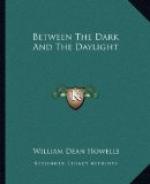“Oh, I’m not a real Bostonian,” our guest replied. “I’m not abusing you on behalf of a city that I’m a native proprietor of. If I were, I shouldn’t perhaps make your decadent Easter Parade my point of attack, though I think it’s a pity to let it spoil. I came from a part of the country where we used to make a great deal of Easter, when we were boys, at least so far as eggs went. I don’t know whether the grown people observed the day then, and I don’t know whether the boys keep it now; I haven’t been back at Easter-time for several generations. But when I was a boy it was a serious thing. In that soft Southwestern latitude the grass had pretty well greened up by Easter, even when it came in March, and grass colors eggs a very nice yellow; it used to worry me that it didn’t color them green. When the grass hadn’t got along far enough, winter wheat would do as well. I don’t remember what color onion husks would give; but we used onion husks, too. Some mothers would let the boys get logwood from the drug-store, and that made the eggs a fine, bold purplish black. But the greatest egg of all was a calico egg, that you got by coaxing your grandmother (your mother’s mother) or your aunt (your mother’s sister) to sew up in a tight cover of brilliant calico. When that was boiled long enough the colors came off in a perfect pattern on the egg. Very few boys could get such eggs; when they did, they put them away in bureau drawers till they ripened and the mothers smelt them, and threw them out of the window as quickly as possible. Always, after breakfast, Easter Morning, we came out on the street and fought eggs. We pitted the little ends of the eggs against one another, and the fellow whose egg cracked the other fellow’s egg won it, and he carried it off. I remember grass and wheat colored eggs in such trials of strength, and onion and logwood colored eggs; but never calico eggs; they were too precious to be risked; it would have seemed wicked.
“I don’t know,” the Boston man went musingly on, “why I should remember these things so relentlessly; I’ve forgotten all the important things that happened to me then; but perhaps these were the important things. Who knows? I only know I’ve always had a soft spot in my heart for Easter, not so much because of the calico eggs, perhaps, as because of the grandmothers and the aunts. I suppose the simple life is full of such aunts and grandmothers still; but you don’t find them in hotel apartments, or even in flats consisting of seven large, light rooms and bath.” We all recognized the language of the advertisements, and laughed in sympathy with our guest, who perhaps laughed out of proportion with a pleasantry of that size.
When he had subdued his mirth, he resumed at a point apparently very remote from that where he had started.




